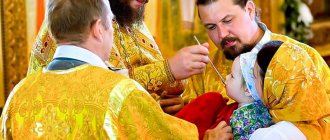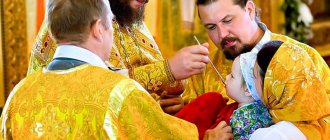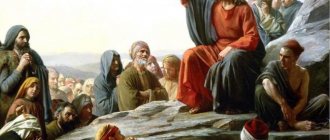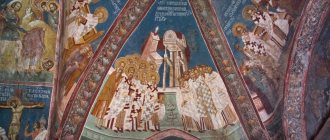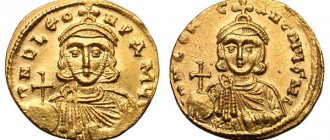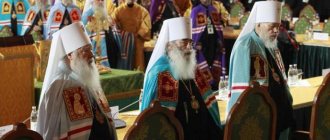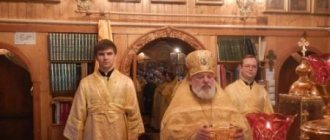Holy Fathers of the Seven Ecumenical Councils
This celebration brings together all seven pillars of the Church - the seven Ecumenical Councils.
Our Church separately celebrates the memory of the holy fathers of each Ecumenical Council.
The Seven Ecumenical Councils are the formation of the Church, its dogmas, and the definition of the foundations of Christian doctrine. Therefore, it is very important that in the most secret, dogmatic, legislative issues, the Church has never taken the opinion of one person as the highest authority. It was determined, and to this day it remains so, that the authority in the Church is considered to be the conciliar reason of the Church.
The first two Ecumenical Councils took place in the fourth century, the next two in the fifth, and two in the sixth.
The era of Ecumenical Councils ends with the Seventh Ecumenical Council in 787.
In the 4th century, when there was a period of martyrdom - pagans and Christians - it was obvious and clear who was on which side, who was fighting for what.
But the enemy does not sleep, the struggle continues and takes on more sophisticated turns: this is not the struggle of paganism with Christianity, but the struggle of the devil and man. There are no pluses and minuses here anymore. Now in the very Christian environment, among Christians themselves, church people appear who carry the spirit of darkness - it happens that these are presbyters or even saints. Infected by the authority of the “church teachers” of heresy, hundreds and thousands of Christians follow them.
The devil invents such a new way of fighting man: the Church is “tested for strength” from within by heresies and schisms, heretical teaching.
The 4th century - the time of the first two Ecumenical Councils - was an educational era, when the great teachers of the Church came: Basil the Great, John Chrysostom, Gregory the Theologian, Athanasius the Great, Nicholas of Myra and many others.
The Holy Fathers begin to formulate theological thought, but until it is formed, heretics are trying to replace concepts, revelations about God, about the persons of the Holy Trinity - the Savior, the Holy Spirit. It becomes extremely important to get together and develop those holy rules that will remain and will be stronger than stone, harder than iron, and will remain until the end of the entire existence of the world.
Ecumenical Councils usually met during the most difficult historical periods in the life of the Church, when unrest in the Christian world forced the Orthodox people to make a choice.
The mighty era of the Ecumenical Councils from the 4th to the 8th centuries developed those dogmas and those laws that are indisputably practiced in our Church to this day.
The Church survived such incredible martyrdom, incredible trials, and Orthodoxy triumphs in 1014.
The holiday, which honors the memory of the holy fathers of the seven Ecumenical Councils, will never lose relevance, because to this day the enemy of the human race is inventing new, very serious ways of fighting man and the Church.
The great ascetic of our time, the recently deceased Archimandrite John Krestyankin, noted that the Russian Church is long-suffering in the image of its Founder - we all follow the Lord, the Crusader.
What did the 20th century do to our Church? How far was man from God in ancient times and now?
Look at other Churches, who is more like Christ? There are no Churches more martyred, persecuted and destroyed than the Russian Orthodox Church.
Nowadays we have begun to return our thoughts to God, but there are already false messiahs behind us: whom we did not see in Russia in the 90s: Catholics build their churches, Protestants, Hare Krishnas and Hindus preach - everyone teaches differently about God, but what is happening in Ukraine - the Russian Jordan, on the Dnieper? And now the struggle for Orthodoxy is only intensifying, if we take the situation around the teaching of “Fundamentals of Orthodox Culture” in mass schools. Truly, the battlefield is the heart of man...
The Body of the Church is torn apart by fundamental differences; man becomes the highest idol, the “measure of all things.” Young people want to be successful, rich and follow this dubious path to achieve success in this world by any means, not knowing that the words of the Holy Scripture “seek first the kingdom of God and His righteousness, and all these things will be added to you” (Matthew 6). ,33) remain prophetic for all times.
To understand where to go in this multitude of roads, the memory of the holy fathers and what they left behind stand like pillars, like support. All their dogmatic decisions are preserved by the Orthodox Church. We are called Orthodox, which means we are on the right path.
The Holy Fathers do not allow us to get lost in this stormy sea of modern scientific and non-scientific opinions. They left us an indelible legacy in the form of the dogmas of the Church, which keep us unshakably on the path of Orthodoxy.
Theological thought in the time of the holy fathers was formed under the influence of one powerful factor: the need to protect Christianity, on the one hand, from the onslaught of the pagan world, on the other, from the corrupting influence of heresies. But their fundamental ideas are for all time.
Christian theology developed, forming a harmonious doctrinal system that contained eternal truths, explained in a language understandable to modern man, supported by reasoning.
The greatest dignity of patristic theology is that it developed without breaking away from the apostolic tradition, was based on Divine Revelation and corresponded to the needs of life.
Fathers of the Six Councils
First Ecumenical Council
(MP3 file. Duration 11:49 min. Size 8.6 Mb)
In the name of the Father, and the Son, and the Holy Spirit!
The first who began to address the word of teaching and instruction to the flock of Christ from the pulpit - this elevation in the church for readers, was St. John Chrysostom. Before him, that is, until the end of the 4th century, archpastors and pastors preached from the High Place in the altar, which was arranged like the steps of an amphitheater and was very high, so that the person sitting on it could be seen praying in the temple, and there was also an altar barrier was low. It took a lot of effort for the elderly and sick clergyman to climb the High Place after singing the Trisagion Song, and even now, in following the Divine Liturgy, the blessing of the High Place - the High Throne - is preserved - asking the Lord for strength and help to ascend it.
Today, from this pulpit - a rare element of decoration of modern Orthodox churches in our Fatherland, but consecrated by ancient tradition - with gratitude and warmth we remember those who repeatedly ascended to the pulpits and the High Place to preach, to defend and preserve the truth of the faith of Christ - let us remember the fathers six Ecumenical Councils.
A galaxy of approximately 1,500 men - archpastors and shepherds, immaculate, sober, chaste, dean, honest, hospitable, teaching - over the course of three centuries formulated and put into words what every person who calls himself a Christian should know, created the church doctrine, defined the dogmas of faith - “God-revealed truths that transcend reason, possessing unsearchable depth.”
We ask: why did so many people work, why did they engage in these complex and distracted matters? After all, there is Holy Scripture, in which we find the words of Christ the Savior, by which we are guided in our lives, awaiting salvation and the inheritance of eternal blessings. To show off your intelligence and eloquence? For vanity and pride?
No! The fathers of the Ecumenical Councils we remember did not work for the sake of glory or because of idleness. “Only the malice of heretics forces us to talk about what it would be better to remain silent,” said one of them, St. Hilary of Pictavia.
“Beware of those who cause divisions and temptations, contrary to the teaching you have learned, and turn away from them; for such people serve not our Lord Jesus Christ, but their own belly, and with flattery and eloquence they deceive the hearts of the simple” (Rom. 16: 17–18), - with these words the Apostle Paul warns the Roman Christians of the 1st century. But how often do we forget this and succumb to temptation, including the temptation of flattering false teaching and lies.
Heresy is most often the fruit of a proud heart and an arrogant mind
“They do not gather figs from thistles” (cf. Matt. 7:16), and nothing good or good can grow from an unclean heart. And if we look at the complex, contradictory period in the life of the Church, which is called the era of the Ecumenical Councils, we will be convinced that heresy is most often the fruit of a proud heart and an arrogant mind.
A strict ascetic and famous confessor, who had more than 200 spiritual daughters, the Alexandrian presbyter Arius set himself the task of uniting Christianity and paganism. Maddened that the second Hypostasis of the Most Holy Trinity - Christ the Savior - was created by God the Father, he hardly tried to seduce the still fragile minds of Christians, who had recently been pagans; on the contrary, his desire was essentially good - to make it easier for the pagans to understand the faith of Christ. Just as Geb and Nut give birth to the good Osiris, just as Apollo appears from Zeus and Leto, so, according to Arius, God the Father creates God the Son. The terrible distortion of the teaching about the Most Holy Trinity and about the eternal existence of each of Her Three Persons should have, in the opinion of the heresiarchal presbyter, become the most effective missionary technique, but it became a willful violation of the Eternal Truth and blasphemy. Many, many residents of Alexandria and Egypt were seduced by the preaching of Arius, this beautiful, gifted poet, who set out his heresy in the form of the poem “Thalia” and rhapsodic songs. The common people were delighted: with a pleasant tune and melodious, these songs were written especially for sailors, for millers, for travelers and became very popular and loved. But we remember that the expression “Vox populi vox Dei” (“The voice of the people is the voice of God”) is erroneous, “for the fickleness of the crowd always borders on madness.”
Nestorius, archbishop of the capital city of the great empire of Constantinople, originally from the remote Syrian city of Caesarea Germanicea on the Euphrates, a man of humble origin, small in stature, with large expressive eyes and light reddish hair, was obsessed with enormous ambition and pride. Can any of us, disciples of Christ, say, turning to the ruler, as Nestorius turned to the emperor: “Give me a land cleared of heresies, and for that I will give you heaven; help me defeat the heretics, and I will help you in the fight against your earthly enemies”? We hope for God's mercy on ourselves and do not even dare to think that it is in our power to give heaven to someone. If Arius saw himself as a great preacher and missionary, then Nestorius took upon himself the responsibilities of the most zealous fighter against evil teachings and heresies. As a result, he himself became the founder of a heresy that denies the Divine Essence of the Lord Jesus Christ.
The desire for absolute power and dominance over his neighbors, namely to be the first among all eastern bishops, prompted the Archbishop of Alexandria Dioscorus to support the heresy of Archimandrite Eutychus, who rejected human nature in the Lord Jesus Christ. Bearing the title of the Thirteenth Apostle and Judge of the Universe, he came to the city of Ephesus to investigate the evil teaching of the Monophysites, but instead condemned the righteous Saint Flavian of Constantinople at a false council. Seeing that he was losing in the struggle for power, he broke off communication not only with the Universal Church as an institution, but also with the True Faith and dragged almost all of Egypt and Syria into heresy.
Cowardly and afraid to contradict the emperor, Patriarchs Sergius of Constantinople, Cyrus of Alexandria, Pope Honorius, justifying their cowardice and servility with the high goal of serving the fatherland and the people, torn apart by Monophysitism and Nestorianism, began to falsely teach about the single will of the Savior. But their heretical compromise did not bring any benefit, and their memory perished noisily.
We believe, dear brothers and sisters, that there is only one Holy Catholic and Apostolic Church, and its body cannot be cut without ceasing to live. Heretics and schismatics are like infected members who have fallen away from this Body and are in a state of spiritual death, without thereby violating the unity and integrity of the Holy Church.
Let's look around and see what is happening now with these ancient heresies. Once a third of Alexandria and Egypt sang “Thalia” Aria, the barbarian tribes of the Goths, Vandals, and Burgundians were Arians. The dioceses of the Nestorian Church of the East stretched from Mesopotamia to China. The Monophysite churches of Syria, Egypt, Armenia and Ethiopia have long lost both interest and ability for theological polemics in defending the doctrines of Eutychus and Dioscorus, and have become only closed national churches for Christian peoples surrounded by a hostile Muslim world.
We know that “evil men and deceivers will always abound in evil, deceiving and being deceived” (2 Tim. 3:13), and as long as sin lives in people, new heresies will appear. But they “will not have much time; for their foolishness will be revealed to everyone” (2 Tim. 3:9), the Apostle Paul consoles us. St. Gregory the Theologian echoes him: “There is no harm if the heretics have warmed up and in the spring they dare to crawl out of their holes... I know very well that they will hiss for a short time, then they will hide, overthrown by both truth and time; and the sooner, with greater hope, we present everything to God.”
Instead of unnecessary disputes with heretics, let us work on studying our faith and the history of the Holy Church
So you and I, dear brothers and sisters, will leave everything to God, and He Himself, with truth and time, will destroy all the madness of those who doubt the faith of Christ. We ourselves will refrain from adding even under the plausible pretext of sinful oil to the fire of our anger, irritation, condemnation and slander, which first burns against erring heretics, and then will burn our neighbors and will ultimately turn for ourselves into the endless fire of hellish flames . Instead of unnecessary disputes with heretics (and we remember that “the heretic, after the first and second admonition, turn away.” - Titus 3: 10), let us work on studying our faith and the history of the Holy Church, so that the names of Saints Athanasius the Great, Cyril of Alexandria, Gregory the Theologian, Maximus the Confessor, Mina of Constantinople and other fathers of the six Ecumenical Councils have become near and dear to us.
Today, on the day of remembrance of these true archpastors and shepherds, in order to keep ourselves from extremes and for spiritual edification, let us not forget the simple and wise word of St. Silouan of Athos: “The Holy Spirit, it is said, has appointed bishops in the Church to shepherd the flock of the Lord; and if people understood this, they would love the shepherds with great love and their souls would rejoice at the sight of the shepherd. He who carries within himself the grace of the Holy Spirit knows what I am talking about. The Lord loves them for their humility and love for the people. They are engaged in great work and feat, and for this they are enriched by the mind of the saints, whom they imitate in their lives. Brothers, let us remain in obedience to our shepherds, and then there will be common peace, and the Lord will be with us all by the Holy Spirit.”
Amen.


